
Journal Menu
► ▼ Journal Menu-
- Metals Home
- Aims & Scope
- Editorial Board
- Reviewer Board
- Topical Advisory Panel
- Photography Exhibition
- Instructions for Authors
- Special Issues
- Topics
- Sections
- Article Processing Charge
- Indexing & Archiving
- Editor’s Choice Articles
- Most Cited & Viewed
- Journal Statistics
- Journal History
- Journal Awards
- Society Collaborations
- Conferences
- Editorial Office
Journal Browser
► ▼ Journal BrowserNeed Help?
Announcements
1 October 2025
2024 MDPI Top 1000 Reviewers
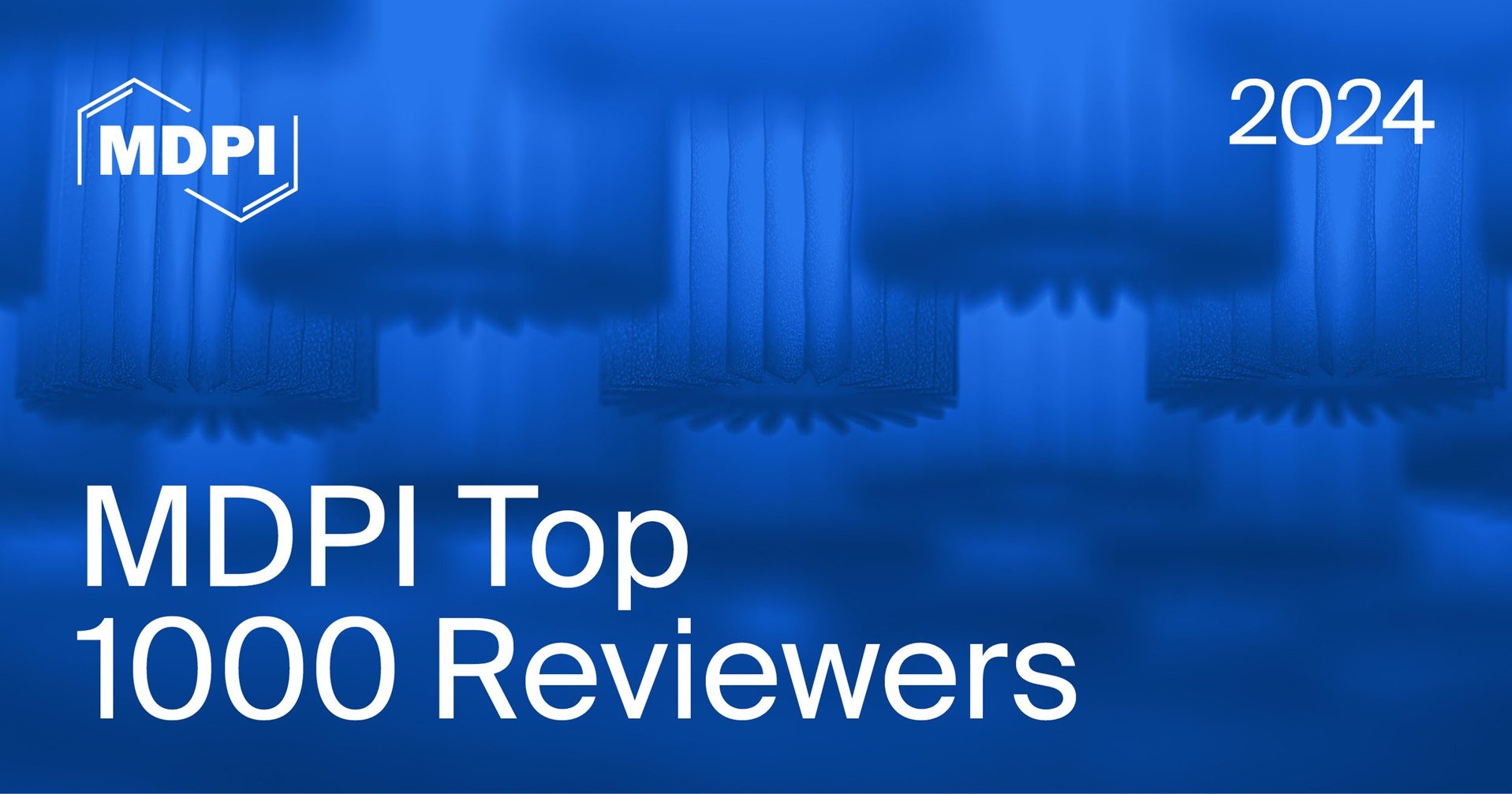
We are honored to recognize the 2024 MDPI Top 1000 Reviewers—scholars whose exemplary commitment to rigorous and constructive peer review is vital in upholding the highest standards of academic publishing.
Selected from a distinguished pool of 215,000 reviewers from 65 countries and regions worldwide, these honorees stand out for their exceptional expertise, diligence, and dedication to advancing research through timely and thoughtful reviews. Their constructive and impartial feedback ensures the publication of high-quality, impactful research, while their timely reviews facilitate swift revisions and faster publication of innovative work.
Peer review is the invisible foundation of academic progress. With gratitude and respect, we celebrate these 1000 scholars who made that foundation stronger in 2024. We respected all privacy preferences, with part of nominees opting for limited attribution.
The names of these reviewers are listed below in alphabetical order by first name:
|
Abbas Yazdinejad |
Hanane Boutaj |
Oscar De Lucio |
|
Abdessamad Belhaj |
Hany H. Arab |
Otilia Manta |
|
Abdolreza Jamilian |
Hao Zang |
Panagiotis D. Michailidis |
|
Abdul Waheed |
Hatem Amin |
Panagiotis Simitzis |
|
Abiel Aguilar-González |
Henry Alba |
Paola Prete |
|
Adina Santana |
Hiroyuki Noda |
Paolo Trucillo |
|
Aditya Velidandi |
Hitoshi Tanaka |
Patricia Kara De Maeijer |
|
Adrian Stancu |
Horst Lenske |
Patrícia Pires |
|
Adriana Borodzhieva |
Hossein Azadi |
Paulo Schwingel |
|
Adriana Cristina Urcan |
Houlin Yu |
Pavel Loskot |
|
Adriano Bressane |
Huaifu Deng |
Pedro García-Ramírez |
|
Agbotiname Imoize |
Huamin Jie |
Pedro Pablo Zamora |
|
Agustin L. Herrera-May |
Hugo Lisboa |
Pedro Pereira |
|
Ahmed Arafa |
Igor L. Zakharov |
Pei-Hsun Wang |
|
Ahmet Cagdas Seckin |
Igor Litvinchev |
Pellegrino La Manna |
|
Ailton Cesar Lemes |
Igor Vujović |
Petar Ozretić |
|
Akash Kumar |
Ildiko Horvath |
Petko Petkov |
|
Akihiko Murayama |
Ilya A. Khodov |
Petr Komínek |
|
Alain E. Le Faou |
Ilya Zavidovskiy |
Petras Prakas |
|
Alain Massart |
Imran Ali Lakhiar |
Petro Pukach |
|
Alejandro Plascencia |
Ines Aguinaga-Ontoso |
Petru Alexandru Vlaicu |
|
Aleksandar Ašonja |
Ioan Hutu |
Phil Chilibeck |
|
Aleksandra Głowacka |
Ioan Petean |
Pia Lopez-Jornet |
|
Aleksandra Nesić |
Irena M. Ilic |
Pietro Geri |
|
Alessio Ardizzone |
Isaac Lifshitz |
Pingfan Hu |
|
Alessio Faccia |
Ismael Cristofer Baierle |
Piotr Cyklis |
|
Alexander E. Berezin |
I-Ta Lee |
Piotr Gauden |
|
Alexander Lykov |
Itzhak Aviv |
Piotr Gawda |
|
Alexander Robitzsch |
Iustinian Bejan |
Pradeep Kumar Panda |
|
Alexandre Landry |
Ivan Matveev |
Pradeep Varadwaj |
|
Alexey Chubarov |
Ivan Pavlenko |
Presentación Caballero |
|
Alexey Morgounov |
Ivana Mitrović |
Pu Xie |
|
Alexis Rodríguez |
Iyyakkannu Sivanesan |
Qingchao Li |
|
Alfredo Silveira De Borba |
Jacek Abramczyk |
Qinghua Qiu |
|
Ali Hashemizdeh |
Jacques Cabaret |
Qingwei Chen |
|
Alison De Oliveira Moraes |
Jaime A. Mella-Raipán |
Radoslaw Jasinski |
|
Aliyu Aliyu |
Jaime Taha-Tijerina |
Radu Racovita |
|
Alok Dhaundiyal |
James Chun Lam Chow |
Rafael Galvão De Almeida |
|
Álvaro Antón-Sancho |
James Chung-Wai Cheung |
Rafael Melo |
|
Amit Ranjan |
James O. Finckenauer |
Rafal Kukawka |
|
Amritlal Mandal |
Jan Cieśliński |
Rafał Watrowski |
|
Ana Isabel Roca-Fernández |
Ján Moravec |
Raffaele Pellegrino |
|
Ana Tomić |
Jarbas Miguel |
Rajender Boddula |
|
Anas Alsobeh |
Jaroslav Dvorak |
Ralf Hofmann |
|
Anastasios Karayiannakis |
Jarosław Przybył |
Ran Wang |
|
Andre Luiz Costa |
Jasenka Gajdoš Kljusurić |
Ranko S. Romanić |
|
Andrea Bianconi |
Jasmina Lukinac |
Ratna Kishore Velamati |
|
Andrea Sonaglioni |
Jawad Tanveer |
Rebecca Creamer |
|
Andrea Tomassi |
Jean Carlos Bettoni |
Reggie Surya |
|
Andrés Fernando Barajas Solano |
Jennie Golding |
Rehan Siddiqui |
|
Andrés Novoa |
Jerzy Chudek |
Renato Maaliw |
|
Andreu Comas-Garcia |
Jhih-Rong Liao |
Reuven Yosef |
|
Andrew Lane |
Jiachen Li |
Ricardo García-León |
|
Andrew Lothian |
Jianzhu Liu |
Richard Murray |
|
Andrew Sortwell |
Jiaquan Yu |
Robert Boyd |
|
Andrius Katkevičius |
Jibing Chen |
Robert H. Eibl |
|
Andromachi Nanou |
Jie Gao |
Robert James Crammond |
|
Andrzej Kielian |
Jie Hua |
Robert Oleniacz |
|
Andrzej Kozłowski |
Jill Channing |
Roberto Passera |
|
Andrzej Zolnowski |
Jinfeng Li |
Rodolpho Fernando Vaz |
|
Ángel Josabad Alonso-Castro |
Jinle Xiang |
Rodrigo Galo |
|
Ángel Llamas |
Jinliu Chen |
Roger E. Thomas |
|
Angelo Ferlazzo |
Jinyao Lin |
Roger W. Bachmann |
|
Angelo Marcelo Tusset |
Jinyu Hu |
Rogério Leone Buchaim |
|
Anil K. Meher |
Jiří Remr |
Roman Trach |
|
Animesh Kumar Basak |
Jiying Liu |
Roman Trochimczuk |
|
Anita Silvana Ilak Peršurić |
João Everthon Da Silva Ribeiro |
Romil Parikh |
|
Anna Kharkova |
Joao Pessoa |
Romina Fucà |
|
Anna Lenart-Boroń |
Joaquim Carreras |
Ronald Nelson |
|
Anna Piotrowska |
John Adams Sebastian |
Rosie Yagmur Yegin |
|
Anne Anderson |
John Van Boxel |
Roxana Lucaciu |
|
Antiopi-Malvina Stamatellou |
Jonathan Puente-Rivera |
Rui Sales Júnior |
|
Antonia Kondou |
Jordi-Roger Riba |
Rui Vitorino |
|
Antonio Miguel Ruiz Armenteros |
Jorge De Andres-Sanchez |
Ruo Wang |
|
Anusorn Cherdthong |
Jorge Guillermo Diaz Rodriguez |
Ryoma Michishita |
|
Aram Cornaggia |
Jorge Luis Zambrano-Martinez |
Sabina Necula |
|
Ariana Saraiva |
José F. Fontanari |
Sabina Umirzakova |
|
Ariel Soares Teles |
José Felipe Orzuna-Orzuna |
Said EL-Ashker |
|
Aristeidis Karras |
José Francisco Segura Plaza |
Saïf Ed-Dı̂n Fertahi |
|
Arnaud Dragicevic |
José Luis Díaz |
Salvatore Romano |
|
Artem Obukhov |
José Luis Rivera-Armenta |
Sándor Beszédes |
|
Arvind Kumar Shukla |
Jose M. Miranda |
Santiago Lain |
|
Arvind Negi |
Jose M. Mulet |
Sara Black Brown |
|
Athanasios A. Panagiotopoulos |
Jose Navarro-Pedreño |
Sarat Chandra Mohapatra |
|
Augustine Edegbene |
José Pedro Cerdeira |
Sarunas Grigaliunas |
|
Aunchalee Aussanasuwannakul |
Jouni Räisänen |
Saša Milojević |
|
Aurel Maxim |
Jui-Yang Lai |
Sawsan A. Zaitone |
|
Barbara Symanowicz |
Juliana Fernandes |
Scott E. Hendrix |
|
Bartosz Płachno |
Julio Plaza Díaz |
Seong-Gon Kim |
|
Bela Kocsis |
Juliusz Huber |
Sergii Babichev |
|
Benedetto Schiavo |
Jun Liu |
Sergio Da Silva |
|
Bernhard Koelmel |
Junyu Chen |
Sérgio Felipe |
|
Bhupendra Prajapati |
Karan Nayak |
Sergio Guzmán-Pino |
|
Bierng-Chearl Ahn |
Karel Allegaert |
Seyed Kourosh Mahjour |
|
Bo Zhou |
Katarina Aškerc Zadravec |
Seyed Masoud Parsa |
|
Bohong Zhang |
Katarzyna Kubiak-Wójcicka |
Shedrach Benjamin Pewan |
|
Bonface Ombasa Manono |
Katarzyna Peta |
Shehwaz Anwar |
|
Bozhidar Stefanov |
Katarzyna Tandecka |
Shengwen Tang |
|
Brach Poston |
Katherine Bussey |
Shih-Lin Lin |
|
Byeong Yong Kong |
Katsuya Ichinose |
Shilong Li |
|
Caio Sampaio |
Kazuharu Bamba |
Shing-Hwa Liu |
|
Caius Panoiu |
Kazuhiko Kotani |
Shu Yuan |
|
Caiyun Wang |
Kazuhiko Nakadate |
Shuohong Wang |
|
Calin Mircea Gherman |
Keigi Fujiwara |
Shuolin Xiao |
|
Camelia Delcea |
Keith Rochfort |
Shuping Wu |
|
Cardellicchio Angelo |
Kenneth Waters |
Sihui Dong |
|
Carlos Alberto Ligarda Samanez |
Keren Dopelt |
Sławomir Rabczak |
|
Carlos Almeida |
Kira E. Vostrikova |
Sojung Kim |
|
Carlos Balsas |
Kit Leong Cheong |
Songli Zhu |
|
Carlos López-de-Celis |
Konstantinos Vergos |
Soonhee Hwang |
|
Carlos Marcuello |
Koyeli Girigoswami |
Soo-Whang Baek |
|
Carlos Pascual-Morena |
Krzysztof R. Karsznia |
Soufiane Haddout |
|
Carlos Torres-Torres |
Krzysztof Szwajka |
Sousana Papadopoulou |
|
Casey Watters |
Krzysztof Wołk |
Spiros Paramithiotis |
|
Castillo Castillo |
Kumar Ganesan |
Spyridon Kaltsas |
|
Changmin Shi |
Lan Lin |
Srecko Stopic |
|
Chao Chen |
László Radócz |
Srinivasan Sathiyaraj |
|
Chao Gu |
Laurent Donzé |
Stefano Mancin |
|
Chao Zhang (China) |
Lei He |
Subhadeep Das |
|
Chao Zhang (Singapore) |
Lei Huang |
Sumedha Nitin Prabhu |
|
Chellapandian Maheswaran |
Leonard-Ionut Atanase |
Sushant K. Rawal |
|
Cheonshik Kim |
Leonardo Henrique Dalcheco Messias |
Svetoslav Todorov |
|
Chia Hung Kao |
Leonie Brummer |
Szymon Janczar |
|
Chiachung Chen |
Levon Gevorkov |
Tadeusz Kowalski |
|
Chiara Cinquini |
Li Fu |
Tadeusz Sierotowicz |
|
Chieh-Chih Tsai |
Lidija Hauptman |
Taha Koray Sahin |
|
Christian Rojas |
Lin-Fu Liang |
Tahir Cetin Akinci |
|
Chu Zhang |
Ling Yang |
Takuo Sakon |
|
Chuanyu Sun |
Lingli Deng |
Tamara Lazarević-Pašti |
|
Chun-Wei Yang |
Ljubica Kazi |
Tao Zhang |
|
Claudia Bita-Nicolae |
Lotfi Boudjema |
Taras P. Pasternak |
|
Constant Mews |
Louis Moustakas |
Tarek Eldomiaty |
|
Cristian Vacacela Gomez |
Luca Ulrich |
Taro Urase |
|
Cristiano Matos |
Luis Adrian De Jesús-González |
Tenzer Robert |
|
Cristian-Valeriu Stanciu |
Luis Alfonso Díaz-Secades |
Thawatchai Phaechamud |
|
Cristóbal Macías Villalobos |
Luis Filipe Almeida Bernardo |
Thomas Michael |
|
Dalia Calneryte |
Luis Nestor Apaza Ticona |
Tiberiu Harko |
|
Daniel Hernandez-Patlan |
Luis Puente-Díaz |
Timea Claudia Ghitea |
|
Daniele Ritelli |
Luiz Antonio Alcântara Pereira |
Timothy John Mahony |
|
Daniel-Ioan Curiac |
Łukasz Rakoczy |
Timothy Omara |
|
Daniil Olennikov |
Łukasz Szeleszczuk |
Tomasz Hikawczuk |
|
Daodao Hu |
Maciej Kruszyna |
Tomasz M. Karpiński |
|
Daqin Guan |
Magdalena Jaciow |
Tomasz Trzepiecinski |
|
Daria Chudakova |
Maha Nasr |
Triantafyllos Didangelos |
|
Daria Mottareale-Calvanese |
Maharshi Bhaswant |
Tsvetelin Zaevski |
|
Dariusz Dziki |
Maksim Zavalishin |
Ulrich J. Pont |
|
Dariusz Gozdowski |
Małgorzata Jeleń |
Vadim Kramar |
|
David Kieda |
Man Fai Leung |
Vagner Lunge |
|
David Luviano-Cruz |
Manickam Minakshi |
Valério Monteiro-Neto |
|
Da-Zhi Sun |
Marcel Sari |
Van Giap Do |
|
Debra Wetcher-Hendricks |
Marcello Iasiello |
Van-An Duong |
|
Demin Cai |
Marco Limongiello |
Vanni Nicoletti |
|
Dennis Dieks |
Marco Zucca |
Vasilios Liordos |
|
Deokho Lee |
Marconi Batista Teixeira |
Vedran Mrzljak |
|
Deyu Li |
Marcos Vinícius Da Silva |
Vicente Romo Pérez |
|
Diego Romano Perinelli |
Marek Cała |
Victor-Alexandru Briciu |
|
Dimitris Tatsis |
Maria G. Ioannides |
Viktor V. Brygadyrenko |
|
Dirceu Ramos |
Maria João Lima |
Vinícius Silva Belo |
|
Dmitrii Pankin |
Maria Kantzanou |
Violeta Popovici |
|
Dmitriy Yambulatov |
Maria Leonor Abrantes Pires |
Viorel Dragos Radu |
|
Dmitry Kultin |
Mariana Buranelo Egea |
Viswas Raja Solomon |
|
Dongwei Di |
Mariana Magalhães |
Viviani Oliveira |
|
Dorota Formanowicz |
Marija Strojnik |
Vlad Rotaru |
|
Dragan Marinkovic |
Marijn Speeckaert |
Vladica Stojanović |
|
Drazenko Glavic |
Marina G. Holyavka |
Volodymyr Hrytsyk |
|
Duguleana Mihai |
Marina Gravit |
Volodymyr Ponomaryov |
|
Dušan S. Dimić |
Mario Cerezo Pizarro |
Waldemar Studziński |
|
E Terasa Chen |
Mario Ganau |
Wanming Lin |
|
Edoardo Bucchignani |
Mariusz Ptak |
Waseem Jerjes |
|
Eduard Zadobrischi |
Marlen Vitales-Noyola |
Wei-Chieh Lee |
|
Edwin Villagran |
Marta Forte |
Weiming Fang |
|
Eitan Simon |
Martha Rocío Moreno-Jimenez |
Weiren Luo |
|
Elena Chitoran |
Marwan El Ghoch |
Weiwei Jiang |
|
Elena Marrocchino |
Marzena Włodarczyk-Stasiak |
Wenan Yuan |
|
Elisabeta Negrău |
Massimiliano Schiavo |
Wenguang Yang |
|
Elisavet Bouloumpasi |
Massoomeh Hedayati Marzbali |
Wenluan Zhang |
|
Elochukwu Ukwandu |
Mateusz Rozmiarek |
Wiesław Przygoda |
|
Emil Smyk |
Matt Smith |
Wilian Paul Arévalo Cordero |
|
Emilio Bucio |
Matteo Riccò |
Wilian Pech-Rodríguez |
|
Emmanouil Karampinis |
Matthias Müller |
Wislei R. Osório |
|
Ericsson D. Coy-Barrera |
Mauro Lombardo |
Wi-Young So |
|
Eugeniusz Koda |
Md. Ataur Rahman |
Wojciech Sałabun |
|
Ewa Chomać-Pierzecka |
Md. Biddut Hossain |
Wojciech Zabierowski |
|
Ewa Tomaszewska |
Meisam Abdollahi |
Xiaofei Du |
|
Ezhaveni Sathiyamoorthi |
Meng-Hwan Lee |
Xiaolong Ji |
|
Fabio Corti |
Meng-Yao Li |
Xiaomin Xu |
|
Fahmi Zairi |
Meysam Keshavarz |
Xiaoshuang Ma |
|
Fanzhi Kong |
Michael Eisenhut |
Xiaoying Liu |
|
Fasih Ullah Haider |
Michael Gerlich |
Xiao-Yong Wang |
|
Fayez Tarsha-Kurdi |
Mihaela Brindusa Tudose |
Xinming Zhang |
|
Fekete Mónika |
Mihaela Niculae |
Xinqiao Liu |
|
Felipe Jiménez |
Mihaela Tinca Udristioiu |
Xinqing Xiao |
|
Feng Wen |
Mihaela Toderaş |
Xuechen Zheng |
|
Ferdinando Di Martino |
Mihai Crenganis |
Xueming Zhang |
|
Fernanda Tonelli |
Mika Simonen |
Xuezhen Wang |
|
Fernando Lessa Tofoli |
Milan Toma |
Xuguang Cai |
|
Fernando Viadero-Monasterio |
Miloš Lichner |
Yair Wiseman |
|
Fethi Ouallouche |
Milos Seda |
Yang Xu |
|
Flavio Arroyo |
MIloš Zrnić |
Yangwon Lee |
|
Flor H. Pujol |
Min Xia |
Yanhong Peng |
|
Florin Dumitru Bora |
Mina Tadros |
Yao Ni |
|
Florin Nechita |
Mingren Shen |
Yaoxiang Li |
|
Francesco Di Bello |
Mircea Neagoe |
Yasushige Shingu |
|
Francesco Galluzzo |
Mirela-Fernanda Zaltariov |
Yaswanth Kuthati |
|
Francisco Haces Fernandez |
Mirjana Ljubojević |
Yaxin Liu |
|
Francisco Rego |
Mirko Stanimirović |
Ygor Jessé Ramos |
|
Francisco Solano |
Mirza Pojskić |
Yi Xu |
|
Frédéric Muttin |
Modesto Pérez-Sánchez |
Yifan Zhao |
|
Fredrick Eze |
Mohammad Ali Sahraei |
Yih Jeng |
|
Gabriel Milan |
Mohammad Javad Maghsoodi Tilaki |
Yiyang Chen |
|
Gabriel Zazeri |
Mohammad Qneibi |
Yoichi Shiraishi |
|
Galina Ilieva |
Mohammed Gamal |
Yong Hwan Kim |
|
Gary Van Vuuren |
Mohammed Sayed |
Yongqi Yin |
|
Gennadiy Kolesnikov |
Mounia Tahri |
Young-joo Ahn |
|
George E. Mustoe |
Muhammad Ahsan Asghar |
Yousi Fu |
|
George Lazaroiu |
Muhammad N. Mahmood |
Yuan Meng |
|
George Xiroudakis |
Muhammad Syafrudin |
Yuefei Zhuo |
|
Georgiy Gamov |
Muhammed Yildirim |
Yugang He |
|
Gerald Cleaver |
Murilo E. C. Bento |
Yuliia Trach |
|
Ghassan Ghssein |
Muthuraj Arunpandian |
Yuliya Semenova |
|
Gian Mario Migliaccio |
Narcis Eduard Mitu |
Yuri Jorge Peña-Ramirez |
|
Giancarlo Trimarchi |
Naser Alsharairi |
Yuri Konstantinov |
|
Gianmarco Ferrara |
Natale Calomino |
Yusheng Xiang |
|
Giovanni Tesoriere |
Natanael Karjanto |
Yutaka Ohsedo |
|
Giuseppe Brunetti |
Nataša Nastić |
Zaihua Duan |
|
Giuseppe Di Martino |
Naveed Ahmad |
Zelaya-Molina Lily Xochilt |
|
Giuseppe Losurdo |
Nebojsa Pavlovic |
Zenon Pogorelić |
|
Giuseppina Uva |
Neli Milenova Vilhelmova |
Zhang Ying |
|
Glauber Cruz |
Nguyen Dinh-Hung |
Zhanni Luo |
|
Glenn Morrison |
Nguyen Quoc Khuong |
Zhao Ding |
|
Gloria Cerasela Crisan |
Nicola Magnavita |
Zhengmao Li |
|
Gordana Wozniak-Knopp |
Nicoleta Dospinescu |
Zhengwei Huang |
|
Gordon Alderink |
Nicoletta Cera |
Zhidong Zhou |
|
Grazia Giuseppina Politano |
Nidhi Puranik |
Zhijun Li |
|
Grigorios L. Kyriakopoulos |
Nikita Osintsev |
Zhixiong Lu |
|
Grzegorz Woroniak |
Nikita V. Martyushev |
Zhizhong Zhang |
|
Grzegorz Zieliński |
Nikola Stanisic |
Zhong-Gao Jiao |
|
Guadalupe Gabriel Flores-Rojas |
Nilakshi Barua |
Zia Muhammad |
|
Guangnian Xiao |
Nobuo Funabiki |
Žiga Laznik |
|
Guanxi Yan |
Octavian Vasiliu |
Zigmantas Gudžinskas |
|
Guoyou Zhang |
Oguzhan Der |
Zishan Ahmad |
|
Gustavo Henrique Nalon |
Oimahmad Rahmonov |
Zivan Gojkovic |
|
Hai-yu Ji |
Olga Morozova |
Zoran Mijić |
|
Hamza Faraji |
Onur Dogan |
Zsuzsanna Bacsi |
|
Hamza Sohail |
Ophir Freund |
21 October 2025
Meet Us at the 13th National Conference on Corrosion and Protection, 7–9 November 2025, Xi’an, China

Conference: The 13th National Conference on Corrosion and Protection
Date: 7–9 November 2025
Location: Xi’an, China
MDPI will be attending the 13th National Conference on Corrosion and Protection as an exhibitor, welcoming researchers from diverse backgrounds to visit and share their latest ideas.
The National Conference on Corrosion and Protection is a biennial national academic conference organized by the Chinese Society for Corrosion and Protection, a first-tier national academic society. The inaugural conference was held in Shanghai in 1962. It is the most prestigious and longest-running national conference in the field of corrosion science in China.
Focusing on intelligent monitoring, green materials, and cross-disciplinary collaborative innovation, the conference will explore cutting-edge issues and advanced technologies in the field of corrosion, showcase the latest scientific achievements, and strengthen interdisciplinary integration.
The following open access journals will be represented at the conference:
- Corrosion and Materials Degradation;
- Metals;
- Coatings;
- Laboratories;
- Alloys;
- Journal of Marine Science and Engineering.
If you will be attending this event, please feel free to start a conversation with us. Our delegates look forward to meeting you in person and answering any questions that you may have. For more information, please visit https://www.cscp.org.cn/member/fair/366.
21 October 2025
Metals | Issue Cover Articles Published in the First Half of 2025
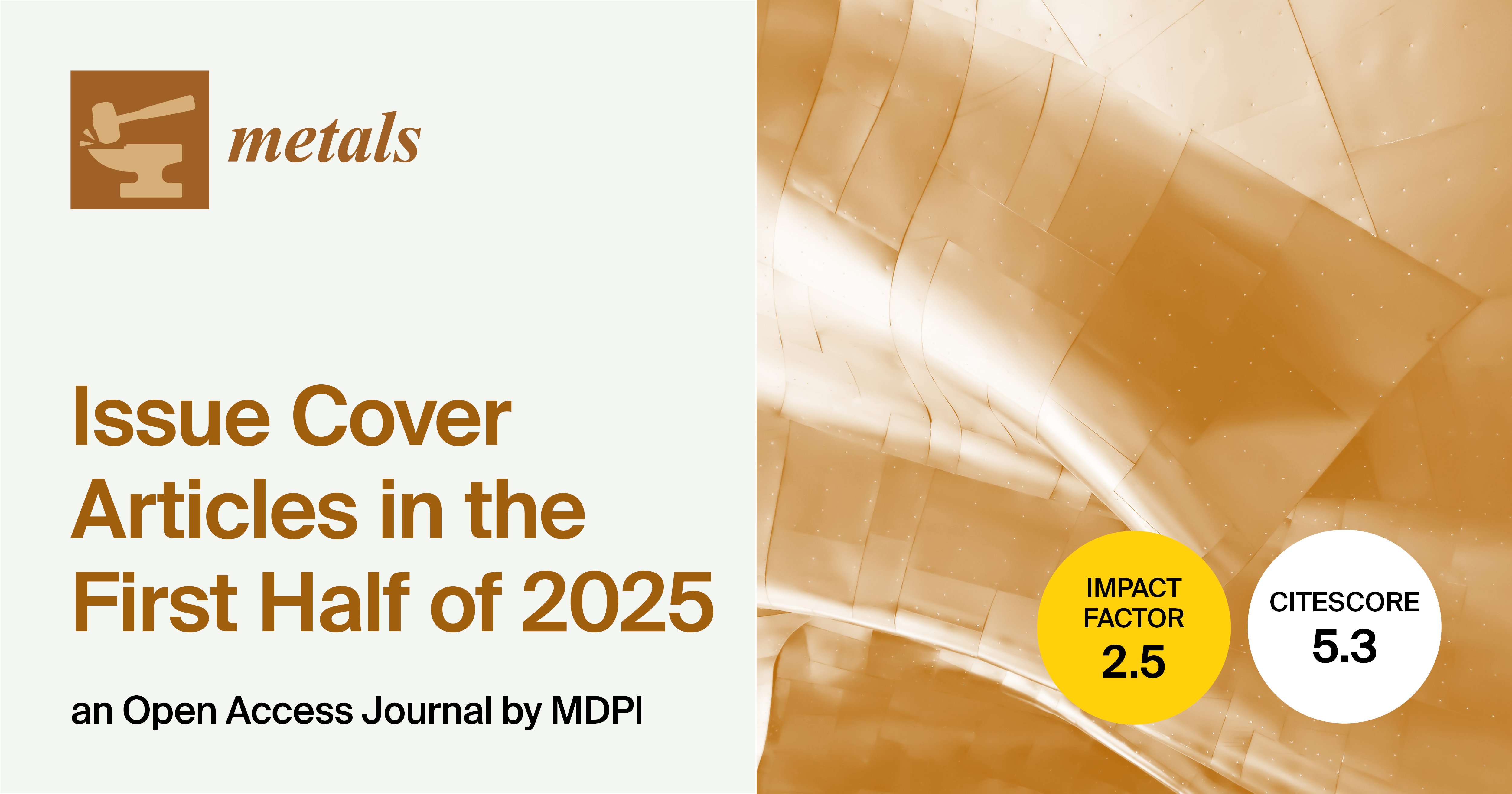
The articles below have been selected as the first half of 2025 Issue Cover Articles by the Editorial Office of the Metals (ISSN: 2075-4701). These articles are from multiple fields within the scope of the Metals, and we hope they can provide insights and references for scholars in related fields. To access more journal volume information, please click on the following link: https://www.mdpi.com/2075-4701/15.
|
|
1. “The Shear Bond Strength of Porcelain Bonding to Cobalt–Chromium Dental Alloys Before and After Thermal Cycling” |
|
|
2. “Texture Analysis of Inconel 718 with Different Modes During Single-Track Laser Surface Re-Melting” Cover Story: Understanding texture formation in melt pools allows for the modification of the surface-layer microstructure and corresponding material properties, providing an opportunity to integrate laser surface re-melting into metal additive manufacturing. Assisted by recently developed real-time temperature monitoring techniques, namely laser surface re-melting and EBSD, this study investigates the fundamental relationship between cooling rate and crystallographic texture formation in single melting tracks on the Inconel 718 plate. The results imply that laser surface re-melting could modify the surface structure from a random grain orientation to a crystallographically layered structure. |
|
|
3. “Influence of Recoater Speed on Powder Bed and Part Quality in Powder Bed Fusion of Metals Using a Laser Beam” Cover Story: In this work, a powder test rig that mimics the real flow conditions of a PBF-LB/M system is used to measure the quality of X3NiCoMoTi18-9-5 powder layers applied at different recoater speeds by determining powder surface roughness. The same recoating settings are then used on a real PBF-LB/M system to produce samples and investigate their densities depending on the recoater speed. The results show that the recoater speed influences the surface of the applied powder bed and has an effect on the density of the manufactured samples. This influence decreases if only high-density samples are considered. |
|
|
4. “Optimized and Additively Manufactured Face Mills for Enhanced Cutting Performance” Cover Story: This study examines topology optimization and the laser powder bed fusion of face mills with experimental modal characteristics and cutting performance. The aim was to decrease the vibration magnitudes of full tool assembly while keeping them stiff against deformation due to cutting forces. Three distinct designs were benchmarked, each with different weight reduction targets, and were fabricated using PBF-LB with M300 maraging steel. Tap tests and the machining of wrought Ti6Al4V were conducted to compare the developed tools. The advantages of utilizing optimized tools highlighted an extension of the insert tool life and successfully reduced flank wear to 100 µm after one hour of Ti6Al4V machining. |
|
|
5. “Production of ZnO Nanofibers from Zinc Galvanizing Flue Dust” Cover Story: This work focuses on the production of ceramic nanofibers from waste materials, which represents a significant contribution to the sustainable use of resources and innovative solutions in the field of nanotechnology. The research builds on existing knowledge of nanofiber production, with a specific focus on the use of zinc galvanizing flue dust. The main objective of the study is to explore the possibilities of converting zinc-containing waste materials into ceramic nanofibers, introducing a new direction in nanotechnology. Laboratory experiments involved leaching processes and electro-static spinning processes of zinc solutions. This study also examines the influence of contaminants from real waste solutions on the production of ceramic nanofibers and compares their properties with nanofibers obtained from synthetic solutions. |
|
|
6.“Oxide Behavior During Laser Surface Melting” Cover Story: Oxides are produced and changed during metal additive manufacturing. We evaluated different contributions to oxide deposition in laser powder-bed fusion and found that direct oxidation of the melt pool has a minor effect and that ejected hot spatter droplets oxidize as they travel through the printer atmosphere. The backscattered electron micrograph revealed the presence of oxides as dark spots on the surface of a laser-remelted Inconel 718 sample. |
15 October 2025
MDPI’s Newly Launched Journals in September 2025
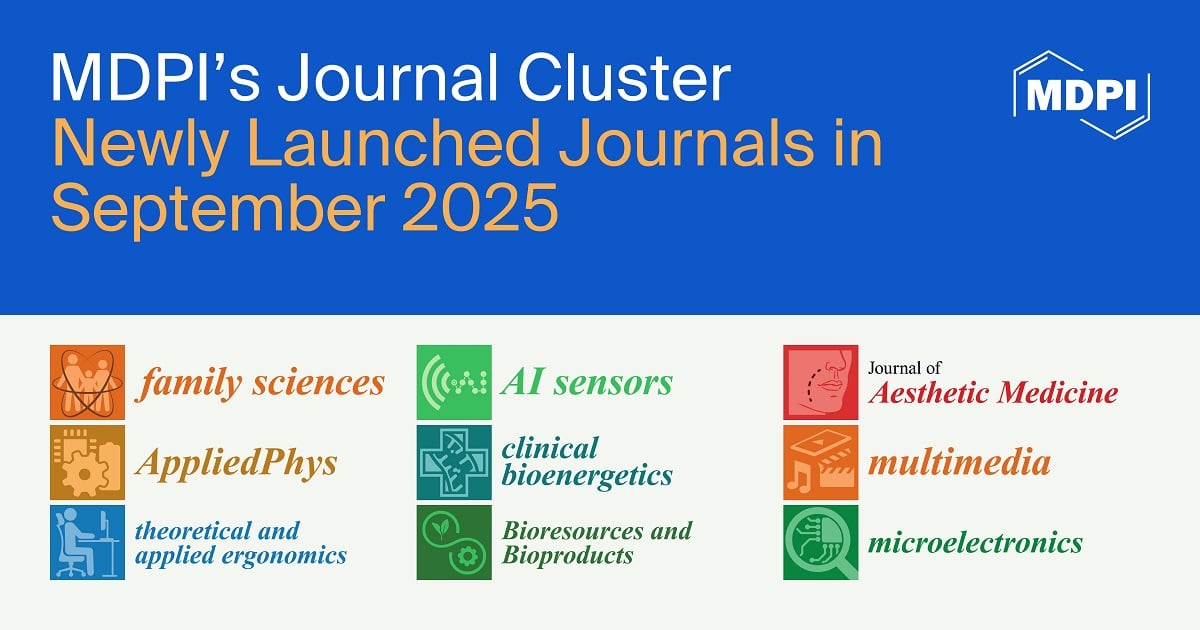
Nine new journals covering a range of subjects launched their inaugural issues in September 2025. We are excited to be able to share with you the newest research rooted in the value of open access.
We extend our sincere thanks to all Editorial Board Members for their commitment and expertise. Each journal is dedicated to upholding strong editorial standards through a thorough peer review process, ensuring impactful open access scholarship.
Please feel free to browse and discover more about the new journals below.
|
Journal |
Founding Editor-in-Chief |
Journal Topics (Selected) |
|
|
Prof. Dr. Joseph G. Grzywacz, San José State University, USA |
family formation and dynamics; family relationships; family diversity and structure; family processes; family challenges; global perspectives of family | |
|
|
Prof. Dr. Chengkuo Lee, National University of Singapore, Singapore |
AIoT sensing technologies; distributed AI and federated learning; AI-enhanced edge analytics; sensor fusion in edge computing; low-power AI sensing; security and privacy in edge-AI systems; AI-driven optimization of IoT networks | |
|
|
Prof. Dr. Steven Paul Nistico, Sapienza University of Rome, Italy |
aesthetics; reconstructive surgery and plastic surgery; dermatology; oral and maxillofacial surgery; surgical procedures; non-surgical procedures | |
|
|
Prof. Dr. Mauro Tonelli, University of Pisa, Italy |
plasma physics and technology; atomic and molecular physics; nuclear physics; quantum physics and technology; dielectrics, ferroelectrics, and multiferroics; semiconductor physics and devices; engineering physics; material physics; biophysics| |
|
|
Prof. Dr. Sergej M. Ostojic, University of Agder, Norway; |
biochemical research methods; biochemistry and molecular biology; cell biology; clinical and medicinal chemistry; clinical neurology; endocrinology and metabolism; medicine, general and internal; nutrition and dietetics; toxicology | |
|
|
Prof. Dr. Michele Nappi, University of Salerno, Italy |
foundations and advancements in multimedia technologies; computational social media analytics; human–AI interaction in social contexts; multimedia understanding and generation for social insight; ethics, fairness, and privacy in multimedia systems | |
|
|
Prof. Dr. Philippe Gorce, Toulon University, France |
ergonomic design and evaluation of workspaces, tools, and equipment; biomechanical analysis and ergonomic interventions for musculoskeletal health; cognitive workload assessment and management; human-computer interaction (HCI) and user experience (UX) research; ergonomic wearables; AI-driven ergonomic assessment tools; neuroergonomics | |
|
|
Prof. Dr. Ronald Charles Sims, Utah State University, USA |
bioresources; bioproducts; bioenergy and biofuels; environmental protection; public health protection; biological waste treatment; biomass transformation; circular bioeconomy; bio-based materials and chemicals; bioresidues | |
|
|
Prof. Dr. M. Jamal Deen, McMaster University, Canada |
device design and engineering; circuit design and system integration; applications and emerging technologies; materials and fabrication innovations; testing, reliability, and standards | |
We would like to thank everyone who has supported the development of open access publishing. If you would like to create more new journals, you are welcome to send an application here, or contact the New Journal Committee (newjournal-committee@mdpi.com).
13 October 2025
Meet Us at the 56th International October Conference on Mining and Metallurgy, 22–25 October 2025, Bor, Serbia
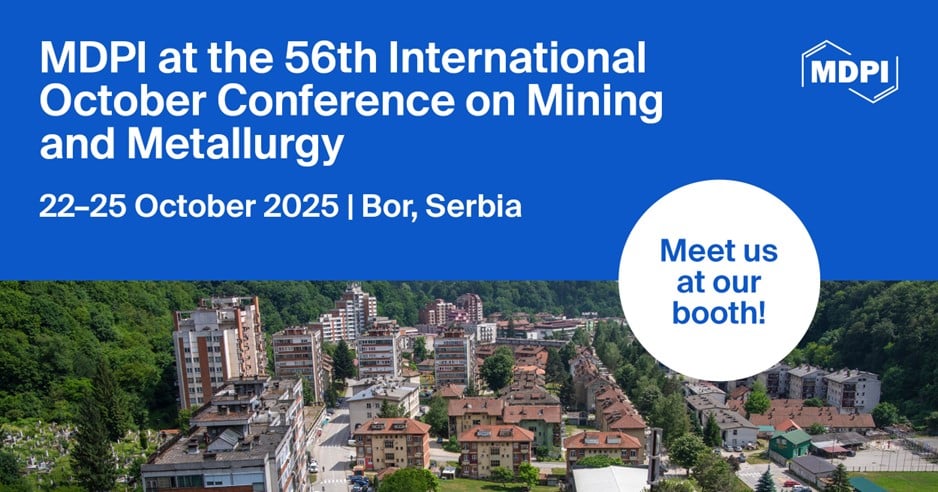
Conference: 56th International October Conference on Mining and Metallurgy
Date: 22–25 October 2025
Location: Bor, Serbia
MDPI will be attending the 56th International October Conference on Mining and Metallurgy, which will be held from 22 to 25 October 2025 in Bor, Serbia.
The 56th International Conference on Mining and Metallurgy (IOC 2025), jointly organized by the Technical College of Belgrade University (Bor) and the Institute of Mining and Metallurgy (Bor), is the oldest and largest academic conference in the field of mining and metallurgy in Southeast Europe. Since its establishment, this conference has always been committed to providing a high-level communication platform for global scholars, engineers, and industry leaders, as well as promoting innovation and development in mining extraction, metal smelting, and resource recycling technologies. This year's conference, with the theme of "Sustainable Mining and Green Metallurgy", focuses on the technological changes and industrial upgrading paths in the industry under the goal of carbon neutrality.
The following MDPI journals will be represented at the conference:
If you are planning to attend the conference, we encourage you to visit our booth and speak to our representatives. We are eager to meet you in person and assist you with any queries that you may have. For more information about the conference, please visit the official website: https://ioc.tfbor.bg.ac.rs/.
2 October 2025
MDPI INSIGHTS: The CEO's Letter #27 - OASPA 2025, COUNTER 5.1, UK Summit in London, MDPI at the Italian Senate

Welcome to the MDPI Insights: The CEO's Letter.
In these monthly letters, I will showcase two key aspects of our work at MDPI: our commitment to empowering researchers and our determination to facilitating open scientific exchange.
Opening Thoughts


MDPI at OASPA 2025: Embracing the Complexity of Open Access
From 22 to 24 September, I joined the OASPA 2025 Annual Conference in Leuven, Belgium, where the theme, “Embracing the Complexity – How do we get to 100% Open Access?” tackled the hard questions about the future of scholarly communication.
With MDPI a longstanding member of the Open Access Scholarly Publishing Association (OASPA) and Platinum sponsor of the conference, I was invited to present and participate in important discussions on how we can continue to move the needle in Open Access (OA) publishing.
From 50% to 100% Open Access
Last year’s OASPA conference celebrated a major milestone – reaching 50% of global research outputs published as OA. But, as noted during the conference, this was the “easy” part. The challenge ahead is much tougher: how do we take OA from 50% to 100%? For many academics and institutions, OA is still relatively new, and thus it is essential for us to continue educating people as to what OA is, how it works, and why it matters.

Stefan Tochev (CEO, MDPI) presenting at OASPA’s 2025 Annual Conference in Leuven, Belgium.
MDPI’s perspective
At MDPI, we are fully committed to this. As a 100% OA publisher, our growth is inseparable from the success of OA itself. In many ways, MDPI is a byproduct of the global adoption of OA, and we play an important role in helping to advance it further.
I had the opportunity to share MDPI’s perspective in the panel discussion entitled: "Hello from the other side: views from fully Open Access journals using APCs," alongside industry colleagues from PLOS, eLife, AOSIS, and Frontiers.
Instead of giving a standard presentation, I highlighted aspects of MDPI that the audience might not be aware of. I also presented on the opportunities and challenges facing publishers that are already fully OA, the importance of diverse models in achieving 100% OA, and why OA is the baseline while Open Science is the future.
Recognizing Gold OA
As part of the panel, I had undertaken to make some bold and provocative statements. I therefore emphasized a point that is sometimes overlooked: we didn’t reach 50% OA without Gold OA – it accounts for more than half of all OA publications today. And we certainly won’t reach 100% OA without it.
“By educating the community and working together, we can continue to take Open Science to the next level”

“When people speak about Gold OA and MDPI, they should ‘put some respek on our name.”
MDPI is a leader in Gold OA and has been a driver of this progress at scale.
While Gold OA and MDPI are sometimes slighted, both deserve recognition for their contributions to advancing Open Science globally.
I closed my presentation with a reminder that the good we do is sometimes overlooked, and that when people speak about Gold OA and MDPI, they should "put some respek on our name."
I’m pleased to have seen attendees sharing positive experiences with MDPI, reminding us that we bring real value to the OA movement and deserve a stronger reputation. We also engaged in constructive conversations about various topics, including cost transparency.
A few themes that I took away from the conference:
- Quality and integrity matter as much as access. OA publishers must not lose sight of research integrity, inclusivity, and sustainability while pursuing 100% OA.
- Global collaboration is essential. Policies, funding models, and infrastructure differ around the world, and we will need cross-border collaboration to make OA a truly global reality.
- Open Science is the bigger story. OA is just the first step – the future lies in open data, open peer review, research reproducibility, etc.
“MDPI’s scale allows us to better support authors, reinvest in communities, and push Open Science forward”
How we communicate MDPI’s role
For us at MDPI, this is also a reminder of how we communicate externally. When we tell our story, we shouldn’t forget to start with the bigger picture – Open Science and Open Access. Then we connect it to MDPI, our journals, services, and initiatives, exemplifying the fact that we are part of a mission larger than ourselves.

MDPI colleagues Clàudia Aunós (Society Partnerships), Marta Colomer (External Affairs), Stefan Tochev (CEO), and Nikola Paunovic (Scilit), at OASPA’s 2025 Annual Conference in Leuven, Belgium.
The journey to 100% OA will not be simple. But by educating the community and working together, we can continue to take Open Science to the next level.
Impactful Research

MDPI becomes COUNTER 5.1 compliant across 480+ Journals
I’m pleased to share that MDPI has officially become COUNTER 5.1 compliant and has joined the COUNTER Registry.
For those who might not be familiar with it, COUNTER provides international standards for tracking and reporting how research is being used. By becoming COUNTER 5.1 compliant, MDPI can now deliver credible, comparable, and transparent usage reports across our entire journal portfolio.
“MDPI is showing that they want to be measured against the same yardstick as other publishers”
Why is this important?
Because usage statistics aren’t just numbers: they’re powerful tools that help our authors, institutions, and consortia understand the real impact of their research. With COUNTER compliant reports, our institutional partners can now make more informed decisions about publishing agreements, funding allocations, and the long-term value of Open Access.
In practical terms, MDPI will now provide Platform, Title, and Item Reports, with standardized usage views available at the institute and consortium level. These reports cover usage from January 2024 onwards and will be updated monthly. Institutions will be able to access them via SuSy, or automatically through the COUNTER API.

I’d like to highlight and thank Becky Castellon, our Institutional Partnerships Manager, who has played a key role in driving this project forward. Becky captured it perfectly when she said: "Through these usage reports, our global research community can access trustworthy data about how their work is being used and accessed
This information is often vital for reviewing publishing partnership agreements and for making informed decisions about future funding allocations."
We also received encouraging feedback from Tasha Mellins-Cohen, Executive Director at COUNTER Metrics:
"We’re delighted to see born-OA publishers engaging with COUNTER. Our normalised usage metrics are relied on as the basis for credible return-on-investment calculations by libraries worldwide. By adopting the COUNTER standard, MDPI is showing that they want to be measured against the same yardstick as other publishers."
For MDPI, this milestone is another step in our commitment to transparency, trust, and impact. By adopting COUNTER’s standards, we’re not just aligning with best practice; we’re ensuring that Open Access publishing is measured on the same terms as traditional publishing, proving its value in concrete and globally recognized ways.
This is an important milestone for MDPI, but more importantly for the researchers, librarians, and institutions we serve. Transparency builds trust, and COUNTER compliance helps us show the global reach and influence of Open Access publishing in the clearest way possible.
Inside Research

Lin Li (Publisher, MDPI), Stefan Tochev (CEO, MDPI, Prof. Chengkuo Lee (Editor-in-Chief, AI Sensors), and Constanze Schelhorn (Head of Indexing) at restaurant in Basel, Switzerland.
Welcoming Prof. Lee (EiC of AI Sensors) to Basel
On 11 September, we welcomed Prof. Dr. Chengkuo Lee, Editor-in-Chief of our new journal AI Sensors, to our Basel office. Prof. Lee is a high profiled researcher (h-index 104, 37,000+ citations), a longtime collaborator with MDPI (25 published articles), and has already chaired several AI Sensors (AIS)-related conferences with us, including the recent event in Kuala Lumpur, where AI Sensors held its first editorial board meeting.

Stefan Tochev (CEO, MDPI) showing Special Issue reprint books as part of a tour of MDPI’s Basel office.
Every journal has a story
During his visit, we exchanged ideas on how to build the journal’s identity and impact. A key takeaway that I shared was that every journal has a story: its vision, its purpose, and the community it brings together.
That story is what connects with readers and authors, beyond metrics alone.
I encouraged everyone working on journals to reflect: What is the story of your journal? And how can you bring that story to the forefront in how you communicate about it?
How MDPI supports new journals

Constanze Schelhorn (Head of Indexing, MDPI) presenting on the MDPI indexing process at the company’s headquarters in Basel.
We also shared with Prof. Lee how MDPI supports journals through our Institutional Open Access Program, indexing expertise, and the work of our Journal Relationship Specialists.
Launching a new journal is ambitious, but with our strong track record (93% Scopus and 87% Web of Science acceptance rates in 2024), Prof. Lee felt confident that AI Sensors will find its place in the scholarly landscape.
Having spent some hours together, it’s clear that Prof. Lee is not only an Editor-in-Chief but also an ambassador for MDPI. His leadership and collaboration reflect the mission MDPI by which MDPI lives: accelerating Open Access and advancing Open Science.
Special thanks to Constanze Schelhorn (Head of Indexing), Ting Leng (JRS, Managing Editor, AI Sensors), Lin Li (Publisher, AI Sensors), Aimar Xiong (Publisher), and Christian Eberhard (Office Administrator, Basel), for organizing and hosting the meeting.
Coming Together for Science

Highlights from the MDPI UK Summit in London
I was pleased to be back in the UK in September, supporting our Manchester team in hosting their first MDPI Summit in London. This day-and-a-half private event brought together 25 Chief Editors and Associate Editors to exchange knowledge, learn about latest developments at MDPI, and engage in discussions on advancing Open Science. The program included MDPI and guest presentations, and Q&A sessions.
Why these summits matter
Our Summits provide a platform to:
- Share updates on the latest developments at MDPI, our editorial processes, research integrity practices, and indexing.
- Highlight collaborations with institutions and societies in the region.
- Offer external perspectives from guest speakers.
- Create space for Chief Editors to share their insights, ask questions, network, and help shape MDPI’s path forward.
These gatherings are more than updates: they improve our relationships with Chief Editors, who serve not only as leaders of their journals but also as ambassadors for MDPI within the research community. We often hear that this type of event is unique, something many other publishers do not provide. It shows that we care and are willing to go the extra mile to recognize and engage our key collaborators.
|
|
|
|
MDPI and the UK: Key facts
- With over 80,000 publications, the UK is MDPI’s eighth-largest contributor.
- MDPI is the fourth-largest publisher in the UK, accounting for 11% of the country’s 89,526 Open Access publications in 2024.
- We collaborate with more than 4,000 active UK Editorial Board Members, 48% of whom have an H-index above 26. This includes 49 Editors-in-Chief and 74 Section Editors-in-Chief.
- MDPI maintains over 1,000 IOAP agreements worldwide, with 63 from the UK.
“We are willing to go the extra mile to recognize and engage our key collaborators”
|
|
|
|
|
|
|
|
Agenda highlights:
- MDPI Overview, Open Access, and UK Collaboration – Stefan Tochev (CEO, MDPI)
- MDPI Editorial Process – Dr. Michael O’Sullivan (Scientific Quality Advisor Lead, MDPI)
- Research Integrity and Publication Ethics – Daisy Fenton (Research Integrity Specialist, MDPI)
- Institutional Partnerships – Becky Castellon (Institutional Partnerships Manager, MDPI)
- Promoting and Developing Your Journal – Prof. Fabio Tosti (Editor-in-Chief of NDT)
- Indexing to Impact – Dr. Michael O’Sullivan (Scientific Quality Advisor Lead, MDPI)
- Engaging our Academic Community – Jaime Anderson Anderson (UK Operations Manager, MDPI)
- Closing Remarks – Stefan Tochev (CEO, MDPI)

MDPI colleagues Stefan Tochev (CEO), Jaime Anderson Anderson (UK Operations Manager), Dr. Michael O’Sullivan (Scientific Quality Advisor Lead), Becky Castellon (Institutional Partnerships Manager), Daisy Fenton (Research Integrity Specialist) at the MDPI UK 2025 Summit in London.
Thank you!
A special thank-you to the Manchester team and all colleagues behind the scenes who made this Summit a success. Your efforts are greatly appreciated. We look forward to building on this momentum with future Summits in Europe and beyond.
Closing Thoughts

Dr. Giulia Stefenelli (Scientific Communications Lead, MDPI) and Stefan Tochev (CEO, MDPI) participating in a press conference at the Italiane Senate in Rome to promote the 2nd International Conference on Environmental Medicine (ICEM)
MDPI at the Italian Senate: Promoting Environmental Medicine and Open Science
On 16 September, Dr. Giulia Stefenelli (Scientific Communications Lead) and I had the honour of participating in a press conference at the Italian Senate in Rome, organized by the Italian Society of Environmental Medicine (SIMA) to promote the upcoming 2nd International Conference on Environmental Medicine (ICEM) (20–21 November 2025).
This is an important event for MDPI, as we are the exclusive publishing partner for ICEM and have recently launched a new journal with SIMA, further building our presence both in Italy and within this important field of research.
Why this matters
- The promotion of ICEM has received extensive national media coverage (more than 15 mentions in major Italian outlets; see links below).
- The press conference brought together leading policymakers, academics, and Nobel Laureates to emphasize the impact of environmental exposures and epigenetics on human health.
- We were introduced to government ministries, university rectors, and influential stakeholders, which helps us bolster MDPI’s visibility and reputation in Italy.
Highlights
Nobel Laureate Sir Richard Roberts joined the discussion, underlining the importance of environmental medicine in shaping future health outcomes. Nobel Laureate Prof. Dr. Tong Zhu (Peking University) will also speak at the November conference.
Institutional representatives included the Italian Minister of the Environment and Energy Security, the Italian Undersecretary for Health, and senior officials from the World Health Organization.
In my closing remarks, I highlighted that:
“Over the past five years, about 65% of research published in Italy has been Open Access, compared to an average of 55% worldwide.”
Italian research ranked seventh among the top 20 countries in average citations during this period, reflecting its strong international influence. Not only is Italy producing a high volume of research; it is also producing research of outstanding quality.
MDPI’s role
This event was not only about promoting ICEM but also about showcasing MDPI’s commitment to Open Access and our ability to connect scientific publishing with leading academic, medical, and policy institutions.
As Giulia Stefenelli noted:
“This event was highly relevant for MDPI, as it not only showcased our strong commitment to OA but also emphasized our role in advancing important fields such as Environmental Medicine.”
Learn more
- Watch the full press conference (Radio Radicale)
- Giulia’s speech: 33:20 (in Italian)
- Stefan’s speech: 57:50 (in English)
- ICEM 2025 Conference Program
- Selected media coverage:
This moment at the Italian Senate shows how MDPI can connect publishing with science, policy, and society to help advance both Open Science and environmental health research on a global stage.
|
|
|
In Rome with Sir Richard Roberts (photo left) and Prof. Giuseppe Novelli (EiC of MDPI journal COVID).
Chief Executive Officer
MDPI AG
30 September 2025
Nobel Prize — The Science Behind the Prize
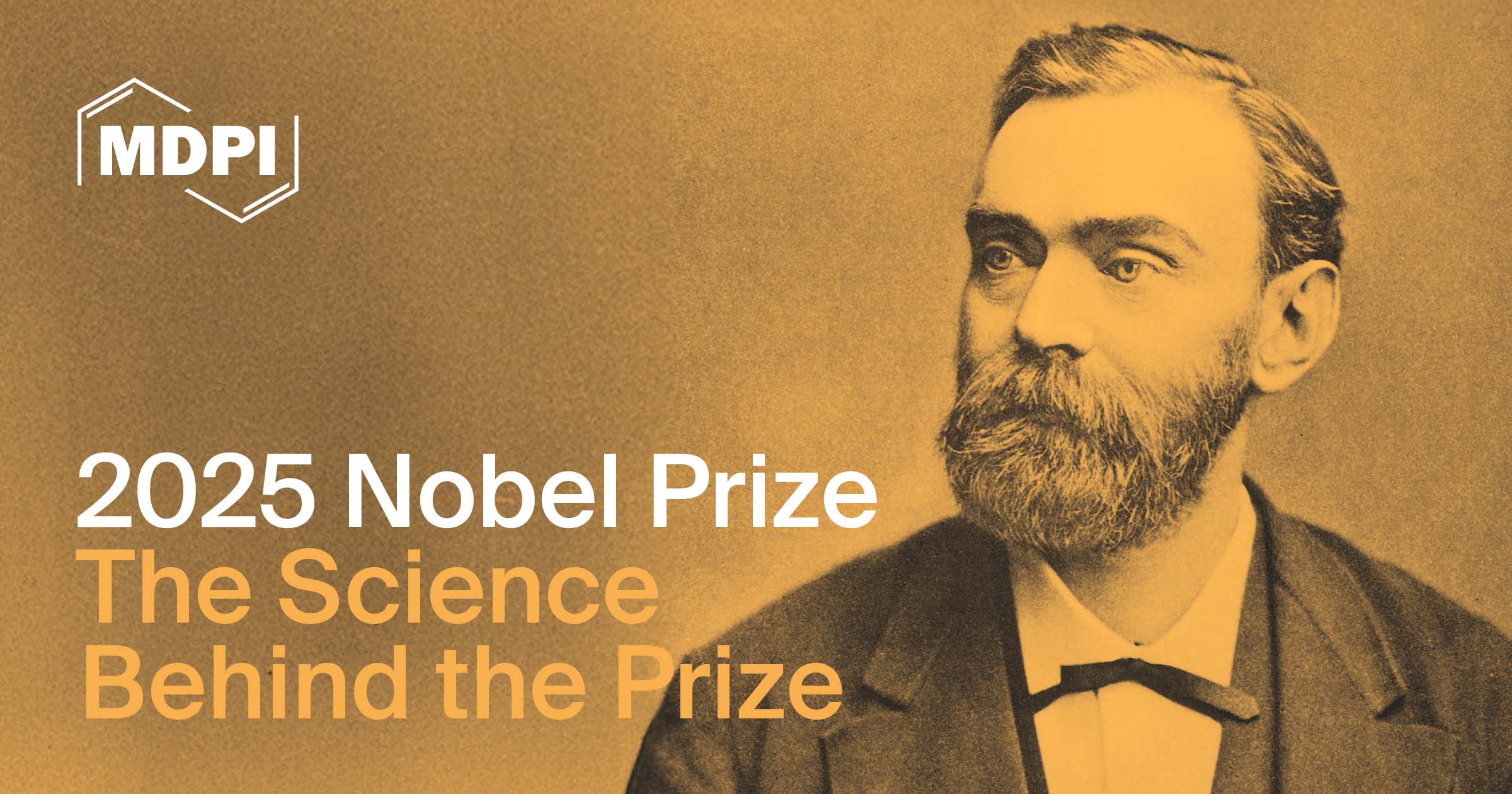
Nobel Prizes are the world’s most prestigious recognition of scientific breakthroughs, honoring discoveries that push the boundaries of knowledge and reshape entire fields. They bring into the public eye researchers whose work might otherwise remain known only within specialized circles.
For many, winning a Nobel Prize is a surreal experience. Laureates often describe a mix of joy, humility, reflection, and gratitude for the teams and collaborators whose contributions made the achievement possible. Behind every Nobel-winning idea lies years of careful, incremental work—a process that often goes unseen.
When Prof. Steven Weinberg won the Nobel Prize in Physics in October 1979, his wife Louise, a legal scholar, reminded him to keep doing the ordinary hard work of science, joking: “Now you have to write some unimportant papers.” True to form, Weinberg continued to push the boundaries of our understanding of the Universe, showing that curiosity and dedication extend far beyond the moment of recognition (Hofmann 2025: https://www.mdpi.com/2073-8994/17/6/840).
Discover the science behind the world’s most transformative ideas
Over the years, dozens of Nobel laureates have published their work with MDPI, entrusting our open access journals to disseminate their findings to a global audience. As of 2024, more than 40 laureates have contributed over 115 articles across 35 journals, ranging from pioneering research on microRNAs and mRNA therapeutics, to fundamental insights in theoretical physics, and advances in structural biology.
We regularly spotlight how Nobel Prize–winning research intersects with the contributions of our authors. This not only celebrates the achievements of the laureates, but also underscores the role of open access in ensuring that transformative science reaches the widest possible audience.
On this page, we invite you to explore selected works by Nobel laureates within the MDPI portfolio, and to join us in celebrating the global impact of their ideas.

The Nobel Prize in Physiology or Medicine 2025 has been awarded to Mary E. Brunkow, Fred Ramsdell, and Shimon Sakaguchi for for their discoveries concerning peripheral immune tolerance. MDPI sincerely invites you to explore research in a related field.

The Science Behind the Prize: 2025 Nobel Physiology or Medicine Roundtable
6 October 2025, 03:30 pm (CEST)
You are welcome to watch the recording here!
The Nobel Prize in Physics 2025 has been awarded to John Clarke, Michel H. Devoret and John M. Martinis for the discovery of macroscopic quantum mechanical tunnelling and energy quantisation in an electric circuit. MDPI sincerely invites you to explore research in a related field.

The Science Behind the Prize: 2025 Nobel Physics Roundtable
7 October 2025, 02:30 pm (CEST)
You are welcome to watch the recording here!

The Nobel Prize in Chemistry 2025 has been awarded to Susumu Kitagawa, Richard Robson and Omar M. Yaghi for the development of metal-organic frameworks. MDPI sincerely invites you to explore research in a related field.
18 September 2025
Meet Us at the 6th Northeastern University Graduate Seminar on Functional Metallic Materials, 26–27 September 2025, Shenyang, China
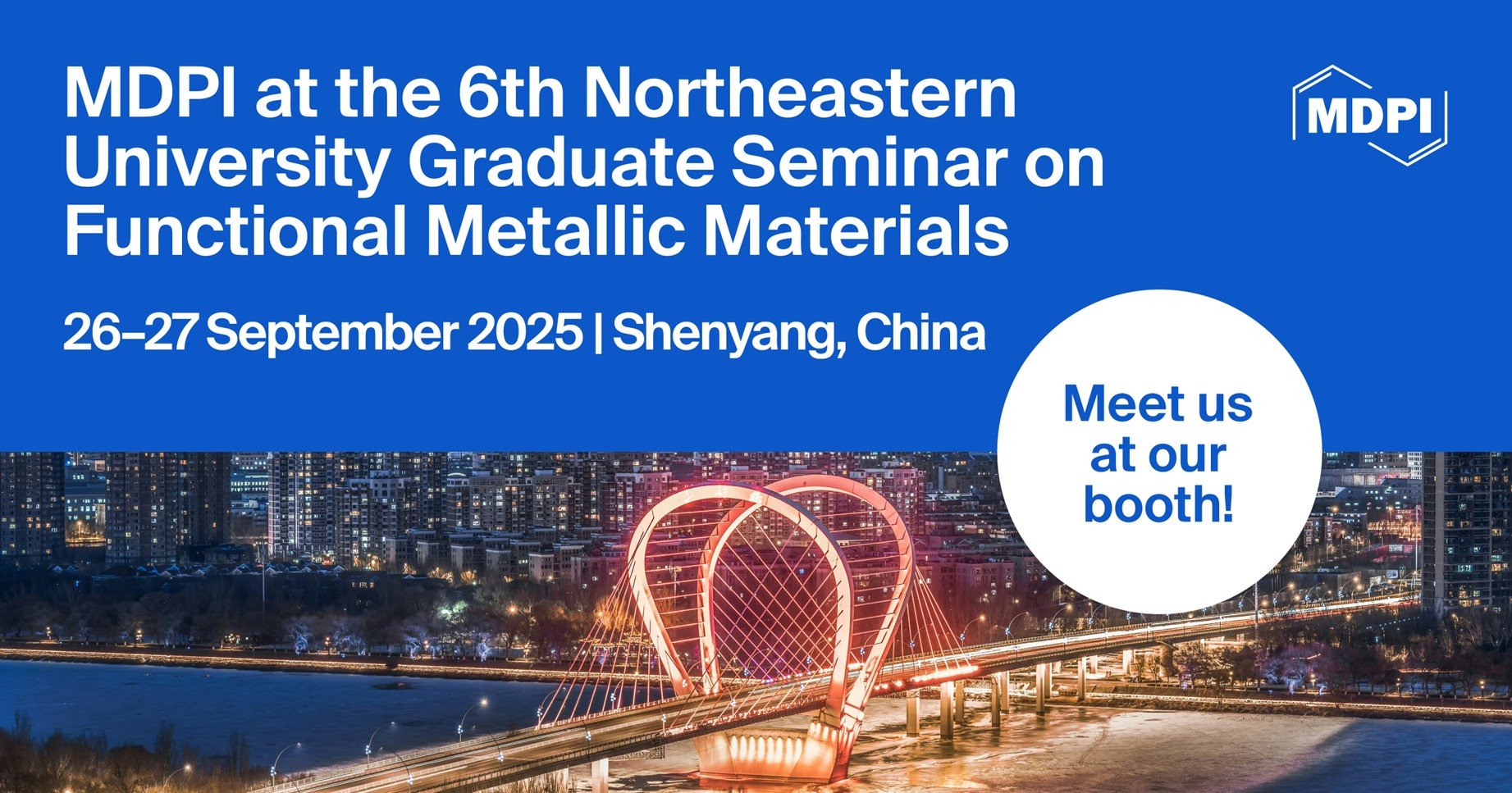
Conference: The 6th Northeastern University Graduate Seminar on Functional Metallic Materials
Date: 26–27 September 2025
Location: Shenyang, China
MDPI will be attending the 6th Northeastern University Graduate Seminar on Functional Metallic Materials as an exhibitor, welcoming researchers from diverse backgrounds to visit and share their latest ideas.
The 6th Northeastern University Graduate Seminar on Functional Metallic Materials is scheduled to be held from 26 to 27 September 2025. This seminar is designed for graduate students and aims to provide an academic exchange platform, facilitating in-depth discussions on the latest research developments and cutting-edge trends in the field of metallic functional materials among both faculty and students. The event is hosted by the School of Materials Science and Engineering at Northeastern University and will feature invited experts in the field who will deliver insightful presentations. In addition, a number of slots will be available for graduate students to present their research. We sincerely welcome all faculty and students to participate in the seminar.
The following open access journals will be represented at the conference:
If you will be attending this conference, please feel free to start a conversation with us. Our delegates look forward to meeting you in person and answering any questions that you may have. For more information about the conference, please visit https://mp.weixin.qq.com/s/l16_xJXHZNDVts8SoH2njg.
16 September 2025
Metals | Highly Cited Papers Published in 2024
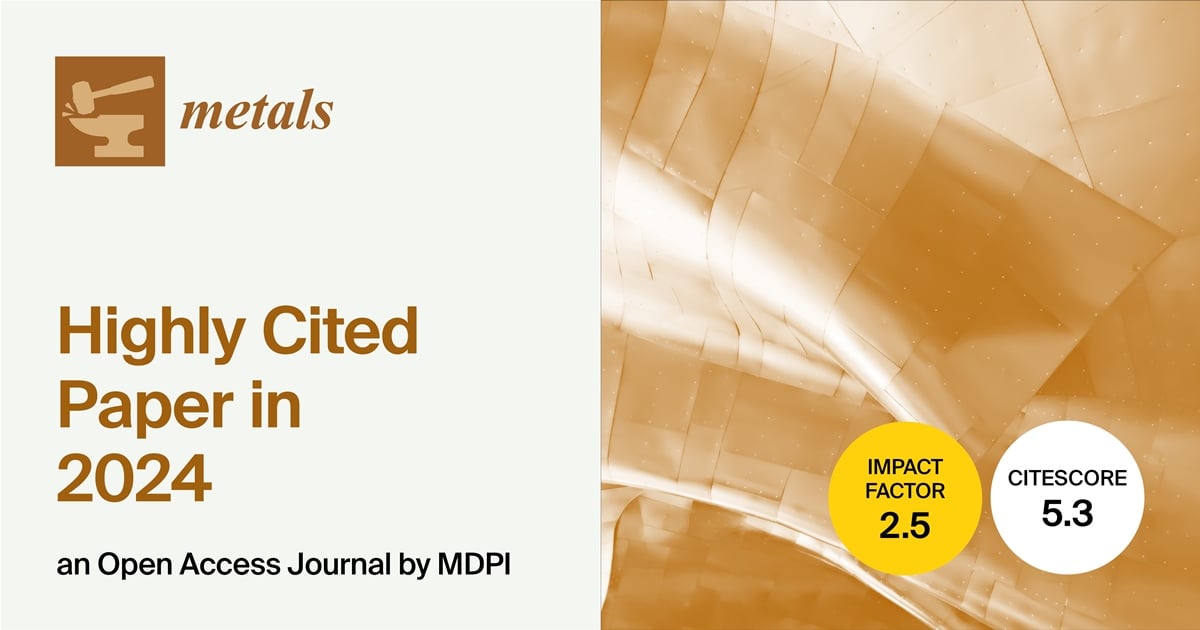
We are delighted to invite you to explore the highly cited papers of 2024 that were published in Metals (ISSN: 2075-4701). We believe this collection will serve as a valuable resource for researchers in this field. As all papers in our journal are published in open access format, you have free and unlimited access to all publications.
1. “Recent Status of Production, Administration Policies, and Low-Carbon Technology Development of China’s Steel Industry”
by Yufeng Qiao and Guang Wang
Metals 2024, 14(4), 480; https://doi.org/10.3390/met14040480
Available online: https://www.mdpi.com/2075-4701/14/4/480
2. “A Review of Deformation Mechanisms, Compositional Design, and Development of Titanium Alloys with Transformation-Induced Plasticity and Twinning-Induced Plasticity Effects”
by Yu Fu, Yue Gao, Wentao Jiang, Wenlong Xiao, Xinqing Zhao and Chaoli Ma
Metals 2024, 14(1), 97; https://doi.org/10.3390/met14010097
Available online: https://www.mdpi.com/2075-4701/14/1/97
3. “Metal Additive Manufacturing (MAM) Applications in Production of Vehicle Parts and Components—A Review”
by Bartłomiej Sarzyński, Lucjan Śnieżek and Krzysztof Grzelak
Metals 2024, 14(2), 195; https://doi.org/10.3390/met14020195
Available online: https://www.mdpi.com/2075-4701/14/2/195
4. “Quality Assurance in Resistance Spot Welding: State of Practice, State of the Art, and Prospects”
by Panagiotis Stavropoulos and Kyriakos Sabatakakis
Metals 2024, 14(2), 185; https://doi.org/10.3390/met14020185
Available online: https://www.mdpi.com/2075-4701/14/2/185
5. “The Effects of Layer Thickness on the Mechanical Properties of Additive Friction Stir Deposition-Fabricated Aluminum Alloy 6061 Parts”
by Hamed Ghadimi, Mojtaba Talachian, Huan Ding, Selami Emanet and Shengmin Guo
Metals 2024, 14(1), 101; https://doi.org/10.3390/met14010101
Available online: https://www.mdpi.com/2075-4701/14/1/101
6. “Research Progress on Thermal Conductivity of High-Pressure Die-Cast Aluminum Alloys”
by Yixian Liu and Shoumei Xiong
Metals 2024, 14(4), 370; https://doi.org/10.3390/met14040370
Available online: https://www.mdpi.com/2075-4701/14/4/370
7. “Co-Precipitation of Metal Oxalates from Organic Leach Solution Derived from Spent Lithium-Ion Batteries (LIBs)”
by Dominik Schmitz, Hariaman Prasetyo, Alexander Birich, Rungsima Yeetsorn and Bernd Friedrich
Metals 2024, 14(1), 80; https://doi.org/10.3390/met14010080
Available online: https://www.mdpi.com/2075-4701/14/1/80
8. “Overview: Machine Learning for Segmentation and Classification of Complex Steel Microstructures”
by Martin Müller, Marie Stiefel, Björn-Ivo Bachmann, Dominik Britz and Frank Mücklich
Metals 2024, 14(5), 553; https://doi.org/10.3390/met14050553
Available online: https://www.mdpi.com/2075-4701/14/5/553
9. “Recent Advances in Hybrid Nanocomposites for Aerospace Applications”
by Beatriz Monteiro and Sónia Simões
Metals 2024, 14(11), 1283; https://doi.org/10.3390/met14111283
Available online: https://www.mdpi.com/2075-4701/14/11/1283
by Zara Cherkezova-Zheleva, Marian Burada, Anca Elena Sobetkii (Slobozeanu), Daniela Paneva, Sabina Andreea Fironda and Radu-Robert Piticescu
Metals 2024, 14(6), 658; https://doi.org/10.3390/met14060658
Available online: https://www.mdpi.com/2075-4701/14/6/658
If you are an active researcher in the field and are passionate about participating in cutting-edge research publications, please do not hesitate to contact the Metals Editorial Office.
10 September 2025
Metals Accepted into ICI Journals Master List
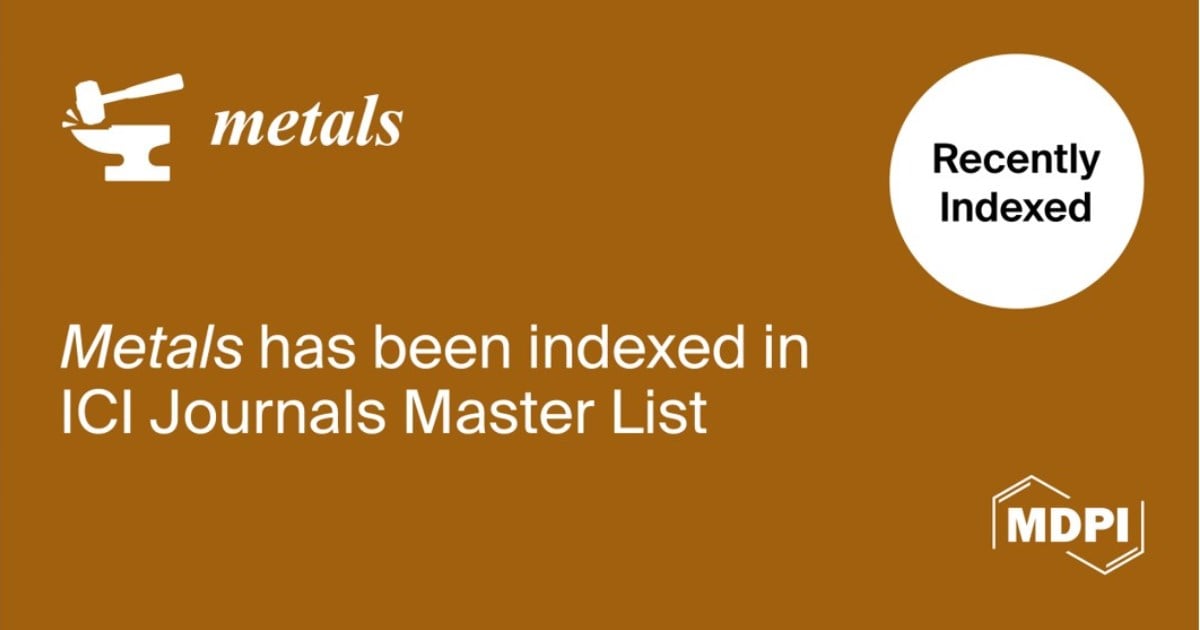
We are pleased to announce that Metals (ISSN: 2075-4701) has been accepted into the ICI Journals Master List, receiving an Index Copernicus Value (ICV) 2024 of 173.50. The ICV index, valid for one year, aims to reflect the journal’s level of development and its impact on the world of science.
The ICI Journals Master List is an international indexing database of scientific journals that has been evaluating submitted periodicals for almost 20 years. Being indexed in the database is dependent upon the condition of passing a positive multidimensional evaluation based on over 100 criteria. The evaluation process is free of charge and available for every journal registered in the ICI World of Journals database.
We would like to express our sincere gratitude to our editors. We also acknowledge that this achievement would not have been possible without the many valuable publications of our authors and the contributions of our dedicated reviewers. We wish to thank you all for your support and hope to receive more contributions from you in the future.
In addition to ICI Journals Master List, Metals is also indexed within Scopus, SCIE (Web of Science), Inspec, Ei Compendex, CAPlus/SciFinder, and other databases.
For more journal statistics, please visit https://www.mdpi.com/journal/metals/stats.
Metals Editorial Office































